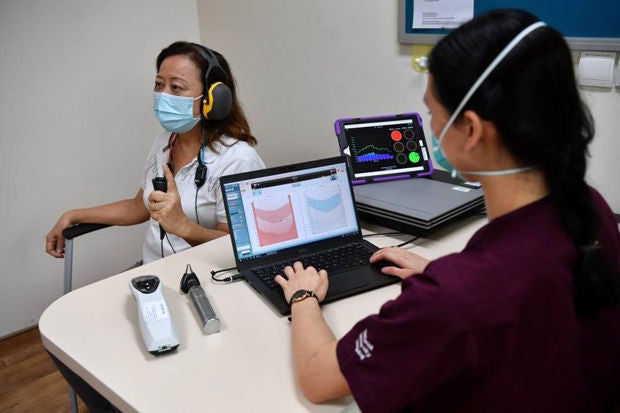
A patient undergoing a pure-tone audiometry to measure her hearing sensitivity at Pioneer Polyclinic on Oct 26, 2021. ST PHOTO: CHONG JUN LIANG
SINGAPORE - People who have hearing issues can get tested at three community clinics instead of the hospital in a pilot scheme made possible by a new device.
The new set-ups at the Pioneer Polyclinic, Tiong Bahru Community Health Centre and the Singapore General Hospital (SGH) Sleep Centre in Outram come amid statistics showing that many people may be suffering from hearing loss.
According to Project Silver Screen, Singapore's nationwide health screening regime for the elderly, an estimated 320,000 seniors experience significant hearing loss.
These clinics make it more convenient for people to seek help from an audiologist as they require only a referral from a general practitioner.
Currently, those who are referred to the hospitals have to undergo a test before being assigned to an audiologist for a separate appointment.
The device at the heart of the pilot was created by a multi-disciplinary team from the National University Health System, SGH and the National University of Singapore (NUS) for the Ministry of Health's National Innovation Challenge on Active and Confident Ageing.
It functions via a combination of in-ear testing equipment, mufflers for noise insulation and an audiometer for measurement of hearing loss.
Before the device is used for testing, an iOS app will be used to ensure ambient noise is at a non-obstructive level to ensure test accuracy.
With this new set-up, physicians can conduct hearing evaluations within spaces that are not sound-insulated.
Previously, testing for hearing loss needed to be conducted within specially sound-proofed rooms in hospitals that cost up to $60,000 to retrofit.
This boothless testing method eliminates the cost of sound-proofing rooms.
It was first used in Pioneer Polyclinic in August last year, before being introduced in Tiong Bahru Community Health Centre in January and SGH in July.

A patient undergoing an otoscopy at Pioneer Polyclinic. ST PHOTO: CHONG JUN LIANG
Professor William Hal Martin from the NUS Yong Loo Lin School of Medicine, who led the development of the new device, said: "Seniors might avoid seeking hearing-related care due to cultural prejudices against accepting hearing loss, and the inconvenience of seeking care through the system.
"However, the hope is that with the enhanced cost effectiveness and portability of these new devices, we will be able to make hearing care more accessible."
The creation of these community hearing clinics is also in line with Singapore's strategy of shifting emphasis away from hospital

Hearing aids meant for the community hearing clinics' patients. ST PHOTO: CHONG JUN LIANG
Mr Gopal Krishna Sarepaka, senior manager and senior and principal audiologist at SGH's Ear, Nose and Throat Centre, said: "Having these hearing clinics in the community not only offer greater convenience for the elderly, but also free up resources for hospitals like SGH so that we can focus on patients with more complex hearing issues."
The team envisions a roll-out of the technology islandwide by different healthcare providers.
Madam Vera Wee, 60, a part-time salesperson who experienced hearing loss for 10 years before getting treated at the community hearing clinic in Pioneer Polyclinic, said: "I only had to get tested and measured for my hearing aid, before I collected my hearing aid about two months later.
"It's very convenient," she said.
Contributed by














 Get it on Google Play
Get it on Google Play